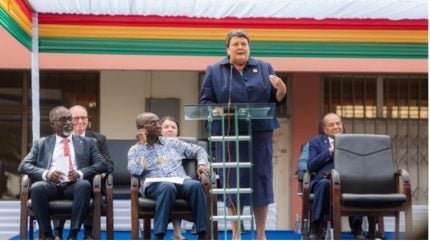
The US Embassy in Ghana, in partnership with the Nuclear Power Ghana (NPG) and Ghana’s Nuclear Regulatory Authority (NRA have commissioned the first NuScale Power Energy Exploration (E2) Centre in Sub-Saharan Africa at the Graduate School of Nuclear and Allied Sciences in Accra. The launch ceremony was attended by the US Ambassador to Ghana, Virginia E Palmer; the Chief Director of Ghana’s Ministry of Environment, Science & Technology Dr Patrick Nomo; officials from the Nuclear Power Institute of the Ghana Atomic Energy Commission (GAEC); and representatives of Ghana’s academic, energy, and government sectors.
The E2 Centre uses state-of-the-art computer modelling within a NuScale 12-module small modular reactor (SMR) control room and will provide education and training for the next generation of African nuclear professionals to operate safe and secure advanced civil nuclear reactors.
The E2 Centre is supported by the US State Department’s Foundational Infrastructure for Responsible Use of Small Modular Reactor Technology (FIRST) programme in partnership with the International Science & Technology Centre and NuScale Power. In addition to the E2 simulator, the SMR Regional Training Hub includes the establishment of a nuclear welding certification program, academic exchanges with Texas A&M University, and other university partnerships for joint development of SMR-relevant curricula.
Bureau of International Security & Nonproliferation Senior Bureau Official Ann Ganzer had announced the E2 Centre at the FIRST Africa Regional Conference held in Accra in 2023. The US-Ghana FIRST partnership began in 2022 based on a Memorandum of Understanding Concerning Strategic Civil Nuclear Cooperation signed in 2021.
The FIRST programme is a capacity building programme launched in April 2021 by the US Department of State with initial funding of $5.3m to promote US technology in emerging countries. Addressing the launch ceremony in Ghana, Virginian Palmer said US SMRs and other advanced reactor technologies “can be scalable to suit a country’s specific needs”. They have a variety of potential applications, including power generation, desalination, and heat for industrial processes.
“Most importantly, the SMRs designed in the United States feature the latest advancements in safety systems, and demonstrate our commitment to the highest standards for nuclear safety, security, and non-proliferation,” she noted. “We believe that the nuclear cooperation between Ghana and the United States reflects our shared commitment towards global non-proliferation, and that the safety and security standards that US technology offers are the path to achieving those shared goals.”






